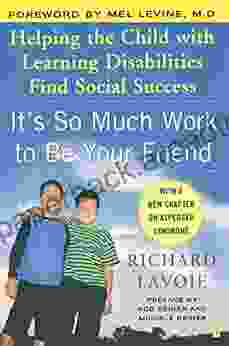In the tapestry of our lives, friendships hold a profound significance. They provide solace, laughter, and a sense of belonging. However, not all friendships are created equal. Some friendships can be draining, manipulative, and even harmful. "It's So Much Work to Be Your Friend" by Aminatou Sow and Ann Friedman is a groundbreaking book that delves into the complexities and challenges of toxic friendships.
Through compelling narratives and expert insights, Sow and Friedman shed light on the subtle signs, manipulative behaviors, and lasting impacts of unhealthy friendships. They challenge the societal pressure to maintain relationships at all costs and empower readers to prioritize their well-being. This article will explore the key themes of the book and provide practical guidance on how to identify and navigate toxic friendships.
The Hidden Costs of Toxic Friendships
Toxic friendships can take a significant toll on our mental, emotional, and physical health. They can lead to feelings of insecurity, anxiety, and depression. They can also erode our self-esteem and make us question our own worth. Sow and Friedman argue that the "work" of maintaining these friendships is not worth the cost to our well-being.
One of the most insidious aspects of toxic friendships is the subtle manipulation and gaslighting that can occur. Manipulative friends may use guilt, shame, or even threats to control our behavior. They may deny our feelings or make us feel like we're crazy. Over time, this can erode our sense of self and make it difficult to trust our own judgment.
Warning Signs of Toxic Friendships
Identifying toxic friendships can be challenging, especially if the behaviors are subtle or intermittent. However, there are some common warning signs to watch out for:
- Emotional Rollercoaster: You feel like you're always walking on eggshells around your friend. They may be extremely charming and attentive one moment, and then cold and distant the next.
- Boundary Violations: Your friend disrespects your boundaries, whether physical, emotional, or digital. They may show up uninvited, borrow money without asking, or share personal information without your consent.
- Manipulation and Guilt: Your friend uses guilt or manipulation to get what they want. They may make you feel sorry for them or threaten to end the friendship if you don't do what they want.
- Energy Drainer: Spending time with your friend leaves you feeling drained and depleted. They may be constantly negative or needy, and they may not be supportive or empathetic when you need it most.
- Comparison and Competition: Your friend constantly compares you to others or tries to outdo you. They may make you feel like you're not good enough or that you have to constantly prove yourself.
Navigating Toxic Friendships
If you find yourself in a toxic friendship, it's important to remember that you have options. You don't have to tolerate unhealthy behavior or sacrifice your well-being for the sake of the relationship.
Sow and Friedman offer several practical strategies for navigating toxic friendships:
- Set Boundaries: Clearly communicate your boundaries and expectations to your friend. Let them know what behaviors are acceptable and what will not be tolerated.
- Limit Contact: If setting boundaries doesn't work, you may need to limit your contact with your friend. This could mean spending less time together, avoiding certain topics, or blocking them on social media.
- Seek Support: Talk to a trusted friend, family member, therapist, or coach about what you're going through. They can provide support, perspective, and guidance.
- End the Relationship: In some cases, it may be necessary to end the friendship completely. This can be a difficult decision, but it may be the best way to protect your well-being.
Empowering Yourself
"It's So Much Work to Be Your Friend" is not just about exposing the dangers of toxic friendships. It's also about empowering readers to prioritize their own well-being and cultivate healthy, fulfilling relationships.
Sow and Friedman encourage readers to:
- Trust Your Instincts: Pay attention to your gut feelings about a friendship. If something doesn't feel right, it's probably best to listen to your intuition.
- Practice Self-Care: Engage in activities that nourish your physical, emotional, and mental health. Surround yourself with people who make you feel good about yourself.
- Set Healthy Boundaries: Learn to say no to things that don't serve you. Protect your time, energy, and well-being by setting clear boundaries with others.
- Seek Professional Help: If you're struggling with toxic friendships, don't hesitate to seek professional help. A therapist can provide support, guidance, and coping mechanisms.
"It's So Much Work to Be Your Friend" is a must-read for anyone who has ever struggled with a toxic friendship. Sow and Friedman provide a compassionate and insightful look at this complex issue. They challenge the societal pressure to maintain relationships at all costs and empower readers to prioritize their well-being. By recognizing the warning signs, setting boundaries, and seeking support, we can navigate the challenges of toxic friendships and cultivate healthy, fulfilling relationships.
Remember, you are not alone. If you find yourself in a toxic friendship, know that there is help available. You deserve to be treated with respect and kindness. You deserve to have friends who make you feel good about yourself and support you on your journey. By breaking free from toxic friendships, you can create space for healthier, more fulfilling relationships. You can build a life filled with people who truly cherish your friendship.







































































